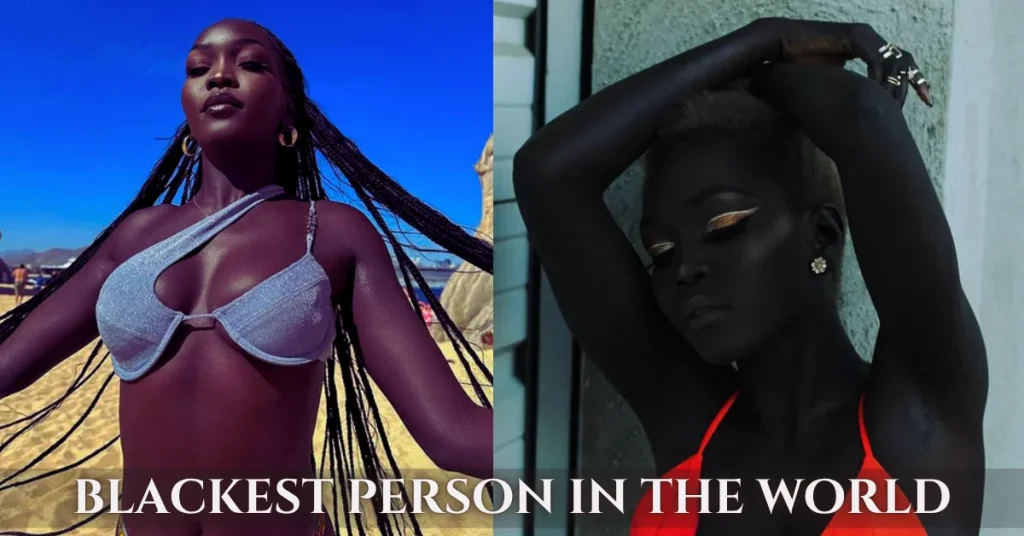Introduction: Understanding the Term “Blackest Person in the World”
The phrase “blackest person in the world” often sparks curiosity, but it goes far beyond appearance. It’s a conversation about:
- Cultural identity
- Historical significance
- Beauty standards
- Societal perceptions of skin tone
In a world influenced by colonial legacies and shifting beauty ideals, exploring this topic offers a chance to celebrate melanin-rich skin and its powerful symbolism. This article delves into the historical, social, and cultural dimensions of deep skin tones and what they truly represent.
Dark Skin Across Cultures: A Deep Heritage
Historical Significance of Dark Skin
In various cultures, dark skin has long been revered and respected:
- Africa: Symbol of strength, resilience, and deep-rooted ancestry.
- Ancient Egypt: Deities like Ma’at were portrayed in rich brown tones, linking dark skin to fertility and wisdom.
- Pre-Colonial Civilizations: Many societies valued dark skin before colonization altered these perceptions.
Modern Cultural Celebrations
- Afro-Latinx communities embrace their blended heritage.
- South Asian cultures traditionally respected darker tones before colonial and media influences led to colorism.
Debunking Harmful Myths About Dark Skin
Misinformation about dark skin contributes to global bias. Let’s challenge some of the most common myths:
- Myth: Dark skin is less attractive.
Truth: Beauty standards are subjective and culturally influenced—not biologically determined. - Myth: Dark-skinned people are less educated or capable.
Truth: Intelligence and potential are not linked to pigmentation. - Myth: Dark skin leads to vitamin D deficiency.
Truth: With proper sun exposure and diet, dark-skinned individuals can maintain healthy vitamin D levels.
Recognizing and correcting these myths is key to dismantling colorist ideologies.
What It Means to Be the “Blackest Person in the World”
Cultural and Social Significance
Being labeled the “blackest person in the world” isn’t just about being dark-skinned—it’s about:
- Embodying ancestral strength
- Representing underrepresented identities
- Challenging outdated beauty standards
More Than Appearance
This label serves as:
- A symbol of pride and resistance
- A platform for global conversations around race, colorism, and representation
- A call to redefine beauty in inclusive, empowering ways
Explore related articles to deepen your understanding before you go.
Celebrating the Beauty of Melanin-Rich Skin
Melanin-rich skin is uniquely radiant and expressive. Here’s why it’s worth celebrating:
Aesthetic Brilliance
- Bold undertones shift in different lights.
- Vibrant fashion colors stand out beautifully against darker skin.
Growing Representation in Beauty
- More inclusive beauty brands are embracing dark tones.
- Social media influencers showcase dark skin proudly and powerfully.
Cultural Empowerment
- Traditional garments and tribal patterns amplify natural features.
- Cultural events celebrate heritage through skin-positive narratives.
Challenges Faced by People with Dark Skin
Despite its beauty and significance, dark skin still encounters societal challenges:
Colorism and Discrimination
- Discrimination can appear in education, employment, and media.
- Even within minority communities, lighter skin is often favored.
Strategies to Overcome Challenges
- Self-empowerment: Embrace and affirm personal identity.
- Community support: Surround yourself with inclusive, uplifting voices.
- Education: Advocate for inclusive curricula and cultural sensitivity.
- Media advocacy: Demand diverse, realistic portrayals.
Media Representation and Its Impact on Perception
Negative Portrayals
- Historically, dark skin in media was linked to stereotypes and villainy.
- Underrepresentation led to a lack of role models for darker-skinned audiences.
Positive Changes on the Rise
- Melanin-rich models, actors, and creators are gaining recognition.
- Platforms like Instagram and TikTok amplify authentic voices and redefine beauty norms.
Why It Matters
When people see themselves positively represented, it:
- Boosts confidence
- Strengthens cultural identity
- Promotes social equity
Conclusion: Redefining Global Beauty Through Inclusivity
The concept of the “blackest person in the world” is far more than pigmentation—it is a powerful emblem of cultural pride, resilience, and redefined beauty.
To move forward:
- We must challenge outdated narratives and appreciate the depth of melanin-rich identities.
- We must embrace diversity not as a trend, but as a truth that defines humanity.
- We must foster platforms where all shades are celebrated, and no one feels left out.
By changing the conversation around color and beauty, we reshape the global understanding of what it means to be truly beautiful—in every hue.
Want to learn more? Our other posts are just a click away!
FAQs
Who is the blackest person in the world?
There’s no officially recognized titleholder, but the term refers to individuals with extremely dark melanin levels. It symbolizes more than appearance—it celebrates heritage and identity.
Why is dark skin celebrated in some cultures and stigmatized in others?
Cultural, historical, and colonial influences shape perceptions. While some societies honor it, others still carry colonial-era biases that associate lighter skin with superiority.
Does having dark skin impact health?
No, dark skin does not inherently lead to health problems. With proper care, people with dark skin can thrive like anyone else.
How is the beauty industry becoming more inclusive?
Brands are expanding foundation ranges, hiring diverse models, and amplifying voices from all backgrounds—especially those with deeper skin tones.
What is colorism, and how is it different from racism?
Colorism is discrimination based on skin tone, often within the same racial group, favoring lighter tones. Racism involves broader discrimination based on race or ethnicity.







